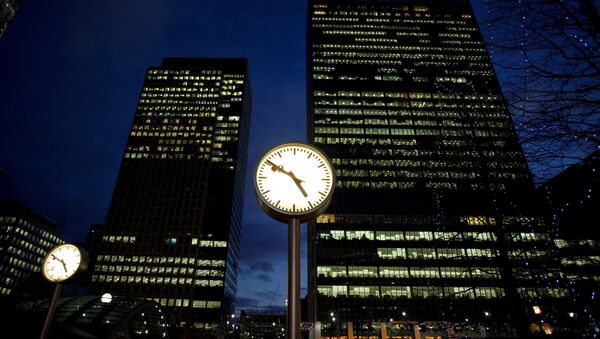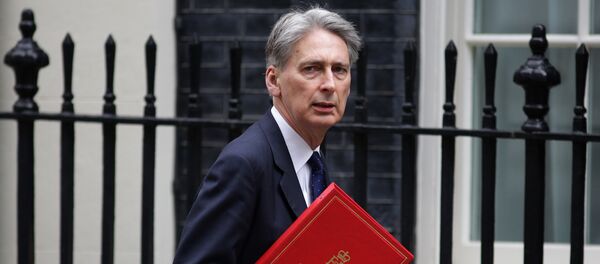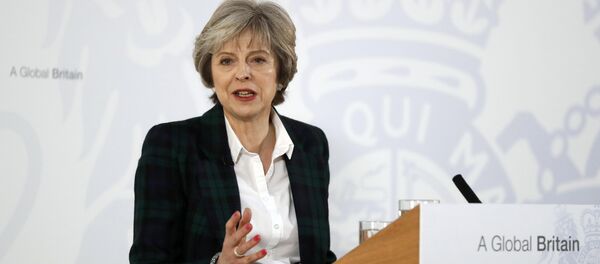MOSCOW (Sputnik), Anastasia Dmitrieva — After the United Kingdom’s decision to leave the EU Customs Union and lose EU single market access, London plans to actively pursue free trade deals with other countries worldwide, benefiting from lower regulations and a more liberal economic policy.
UK EXPORTS HALF OF GOODS AND SERVICES TO EU
Almost half of UK exports in goods and services in 2015 were traded to countries within the European Union, amounting to 220 billion pounds (some $270.6 billion), while 53 percent of UK imports came from the bloc.
Without the EU single market access, the United Kingdom will need to negotiate a new trade deal with the bloc, join the European Economic Area (EEA) like Norway and be obliged to the free movement of persons, or face extra costs and tariffs while trading with Brussels.
"Leaving the single market will have consequences for Britain’s trade with the EU because there simply no other trade arrangement that will give equal access to the EU market. EU exporters will be saddled with extra costs for trading with the EU that their competitors in Europe don’t face," Fredrik Erixon, the director of the European Centre for International Political Economy (ECIPE), told Sputnik.
According to Civitas, a British think tank, UK exporters will face EU tariffs amounting to some $6.3 billion a year, an average of 4.5 percent, if no EU-UK FTA is reached by the spring of 2019 – the period set for negotiating the country’s exit from the bloc. These figures, however, are not final, since EU tariffs are uneven, ranging from duty free to 45 percent on tobacco.
"How large these extra costs will be, and how UK exporters will try to get around them (by relocating to the EU, for instance), depends on the sector and how supply chains are organised. So all of that is a clear disadvantage," Erixon argued.
However, extra funds on EU tariffs which the United Kingdom faces in the coming years, may be easily compensated by the lack of the United Kingdom’s annual EU membership fee, which, according to Her Majesty’s Treasury, amounted to some $16 billion in 2015.
In addition, UK exports benefited last year from the 18-percent plunge in the value of the pound since the June 2016 referendum, making UK goods more attractive for foreign buyers and somewhat lessening the loss of competitiveness due to possible EU tariffs on goods and services.
FREE MOVEMENT OF PERSONS STICKING POINT IN EU-UK NEW FREE TRADE AGREEMENT
While the United Kingdom can adopt the Norway model and acquire access to the European single market through the EEA, it would mean the country would have even less control over its borders than now, which is the very opposite point of Brexit.
"The great advantage for the UK is that there will no longer be free movement of peoples, which is one of the biggest issues the UK currently has with the EU single market. The option of a UK-EU FTA would cover both goods and services, but without free movement of persons would be, in my view, the most sensible option for the UK-EU trade relations post-Brexit," Rafael Leal-Arcas, a professor of European and International Economic Law at Queen Mary University of London, told Sputnik.
Previously, President of the European Central Bank Mario Draghi urged Brussels to take a hard stance on the United Kingdom amid Brexit and give no access to its single market for trade unless the country accepts freedom of movement, since "the four freedoms go all together."
But the British academic noted that most free trade agreements the European Union has do not offer free movement of persons.
"The EU recently concluded an FTA with Canada, namely the Comprehensive Economic and Trade Agreement (CETA). If CETA gives Canada extensive access to the single market in goods and services, but without free movement of persons, how could the EU not offer the same to the UK?" Leal-Arcas, who was awarded Jean Monnet Chair in EU International Economic Law in the United Kingdom by the EU Commission, argued.
"We do not know exactly what the UK will do on its own tariffs. If sets out zero unilaterally then gets to free trade on goods with whole world fast," Patrick Minford, a professor of Applied Economics at Cardiff Business School and former economic adviser to Her Majesty's Treasury, told Sputnik.
If the country sets the same tariffs as Brussels, then it would face regular speed of negotiations to seal FTAs with countries worldwide, Minford, who was awarded Commander of the Most Excellent Order of the British Empire (CBE) for services to economics, explained.
BRAZIL, CHINA, GULF STATES, US IN LINE TO SIGN POST-BREXIT FREE TRADE DEALS WITH UK
Although the United Kingdom is yet to trigger the Article 50 of the EU Lisbon Treaty, thus beginning EU withdrawal and negotiations on free trade with international partners, London has already announced that several countries are interested in signing deals after Brexit.
"Countries including China, Brazil and the Gulf States, have already expressed [their interest] in striking free trade deals with us. It is about embracing genuine free trade," May said Thursday at the World Economic Forum in Switzerland's Davos.
Additionally, the country has already launched trade talks with Australia, India, New Zealand, and, most notably, the United States, the second biggest trade partner of the United Kingdom with total trade amounting to $124.5 billion in 2015.
"Outside the single market and the customs union, the UK is free to do its own free trade agreements with other countries. The UK may be more active than the EU in closing such agreements and that could then give them a benefit," the ECIPE director said.
After Brexit, London could also benefit from lowering domestic regulations and be more attractive trade-wise than the European Union by implementing a more liberal economic policy, Erixon added.
In its latest report, the Organization of the Petroleum Exporting Countries (OPEC) forecast Brexit to impact the UK economy negatively this year and "probably for longer," prompting talks on what should be done to avoid decrease in economic performance.
As academics agree that first and foremost Brexit will negatively affect financial services and universities, agenda of future negotiations between the United Kingdom and the European Union on their trade ties promises to be abundant.









